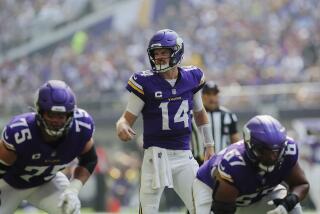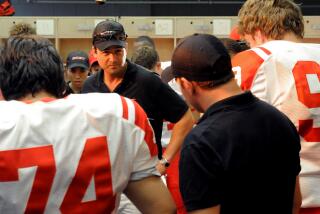Cowboys a House of Cards
T housand Oaks was like summer camp for consenting adults. As ex-assistant Paul Hackett said early in his first camp, “This place is incredible. Just about everybody’s got something going out here.” Landry’s team was an irresistible sexual magnet.
What are the Dallas Cowboys going to do without their beach-blanket bimbo, San Fernando Valley-girl, let-the-games-begin summertime fun?
This is just one of the many questions--and insights and behind-the-scenes peeps--that surface in the fascinating new nonfiction book, “God’s Coach,” by Dallas sports columnist Skip Bayless: the inside story of the rise and fall of a Texas-based sports-and-entertainment business that had the audacity to fancy itself America’s Team.
One of the first things Jerry Jones did after he purchased his favorite NFL team was inquire why that team was forking over a half-million dollars or more each year to train at Cal Lutheran University in Thousand Oaks after it spent an ungodly amount of money in Texas to build a spectacular new training facility.
“One reason, Jones discovered, was that so many front-office people and coaches had girlfriends in California,” Bayless writes.
Maybe a team can get away with losing money when it isn’t losing games. But when the Cowboys began to bite the dust, along came Jones, who found himself wallowing up to his wallet in debt, thanks to team officials such as Tex Schramm and Gil Brandt, who apparently spent money faster than anybody this side of Leona Helmsley.
Jones, who bought the team only on the condition that he could bring old college chum Jimmy Johnson to coach, also had to endure accusations of his being guilty of the greatest betrayal since Judas from disciples of the titular figure of Bayless’ book, Tom Landry.
Firing Landry was tantamount to forgetting the Alamo or tugging the mask off the old Lone Ranger or spouting blasphemy. In the Lone Star State, Tom Landry was a virtual deity.
“God’s Coach” opens with Jones giving Landry the bad news, face to face, near the putting green of a golf course, with the coach’s family in close-enough proximity that they immediately figured out, much to their horror, what was happening. What follows is something of a shocker: A claim that a large group of Cowboy players, upon hearing the news, immediately toasted one another in a bar while saying: “Here’s to the bald-headed . . . He got it just the way he gave it to so many of us.”
Strong stuff, but that’s what this particular book is here to supply. For years and years, we have heard story after story about the wonderful Cowpokes, about what a privilege it was to play for such a fine and upstanding organization, about the lessons other teams could learn from doing things the Dallas way.
What we get instead is a story of massive ego-stroking and overspending, of emotional blackmail and contractual bickering, of unfeeling coaches who couldn’t remember a player’s name but took it very personally if that player wasn’t prepared to make unreasonable sacrifices for the sake of the team.
We learn, more or less, that former Cowboy player Pete Gent’s “North Dallas Forty” was not so much a made-up story as it was a documentary.
Naturally, this tome is already proving to be both titillating and unsettling to those who care for the Cowboys and want never to have heard a discouraging word. Bayless shows America’s Team, warts and all, and it isn’t necessarily a pretty picture. Yet, he tells this story compellingly and candidly, not only through his eyes, but from the Cowboy horses’ mouths.
Bum Bright, the man who sold the Cowboys to Jones, acknowledges how it was he who first broached the idea of dismissing Landry as coach, only to discover that rather than award Landry three one-year contracts, as Bright instructed, his subordinates blithely gave Landry a three-year guaranteed deal. This meant Jones inherited a $1-million debt to Landry the minute he purchased the team.
And then there was Schramm, the team president, whom Bright compared to the fabled circus promoter, P.T. Barnum, in the way Schramm sold the public on the mystique and majesty of the Dallas Cowboys.
“He was like Phineas T. and Jumbo the elephant,” Bright said. “Jumbo wasn’t really the world’s biggest elephant. Tex just convinced everybody it was.”
We read of the amorous adventures of many Cowboys, including former owner Clint Murchison, who couldn’t seem to keep their boots on. Of the transition at quarterback from Dandy Don Meredith to the extremely serious and competitive Roger Staubach, whom Bayless refers to as the “unMeredith.” Of the various tragedies that befell Hollywood Henderson, D.D. Lewis, Lance Rentzel and others.
The Dallas football club, we conclude, was a house of cards just waiting to collapse. Certainly nobody in the book comes across as particularly evil, but any portrayal of Tom Landry that does not nominate him for sainthood is bound to raise a commotion in Texas, as this book already is doing.
We used to enjoy watching the Dallas Cowboys, back when they were always worth watching. This is the best look we have had at them in quite a while.
More to Read
Go beyond the scoreboard
Get the latest on L.A.'s teams in the daily Sports Report newsletter.
You may occasionally receive promotional content from the Los Angeles Times.










